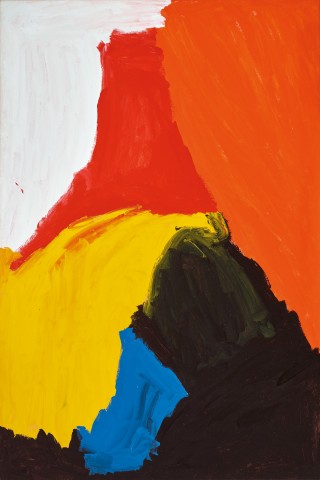DIBIRDIBI COUNTRY, 2008
MIRDIDINGKINGATHI JUWARNDA SALLY GABORI
synthetic polymer paint on linen
152.0 x 101.0 cm
bears inscription verso: artist's name, title, medium and Mornington Island Arts and Crafts cat. 3232-L-SG-0608
Mornington Island Arts and Crafts, Mornington Island, Queensland (stamped verso)
Raft Artspace, Alice Springs, Northern Territory
The Collection of Colin and Elizabeth Laverty, Sydney, acquired from the above in August 2008
Deutscher and Hackett, Sydney, 8 March 2015, lot 118
Private collection, Sydney
Beyond Sacred: Australian Aboriginal Art: The Collection of Colin and Elizabeth Laverty, edition II, Kleimeyer Industries Pty Ltd, Melbourne, 2011, pp. 375 (illus.), 395
Mirdidingkingathi Juwarnda Sally Gabori grew up on Bentinck Island in Northern Queensland, in the traditions of the Kaiadilt people who used the local marine resources to fulfil all their needs and had very little outside contact. After an intense drought followed by a tidal surge made the island uninhabitable, at the age of 24 Mirdidingkingathi (meaning born at Mirdidingki River) Juwarnda (her totem, the dolphin) Sally Gabori and her family were persuaded to move to the adjacent Mornington Island – a move that prompted feelings of huge loss for the Kaiadilt people. Gabori began her art career late in life, at the age of 85, and Judith Ryan of the National Gallery of Victoria compares her immense innovation and star power to that of similar late-starters, Emily Kame Kngwarreye and Lorna Fencer Napurrula.1 Unlike many other Aboriginal language groups, the Kaiadilt did not have a tradition of mark making, whether on tools, objects or bark. Taking this cultural background into consideration, Gabori’s style is completely self-made, conjured from maps in her mind of Bentick Island and the country she loved.
Dibirdibi Country, 2008 depicts one of her favourite subjects and painted more often by the artist than any other – the land and the story inherited from her husband. Known primarily for her brightly coloured canvases, with vital, intuitive and boldly executed brushstrokes, when Gabori paints Dibirdibi, the meanings layer in multitudes; she is at once painting the saltpans of the land, the Rock Cod Ancestor Dreaming of Dibirdibi Country, a portrait of her late husband in connection to his country, and finally, her own longing, loss and memory.
1. Ryan, J., ‘Broken Colour and Unbounded Space’, Mirdidingkingathi Juwarnda Sally Gabori: dulka warngiid: Land of All, Queensland Art Gallery / Gallery of Modern Art, Brisbane, 2016, pp. 33 – 34
CRISPIN GUTTERIDGE
